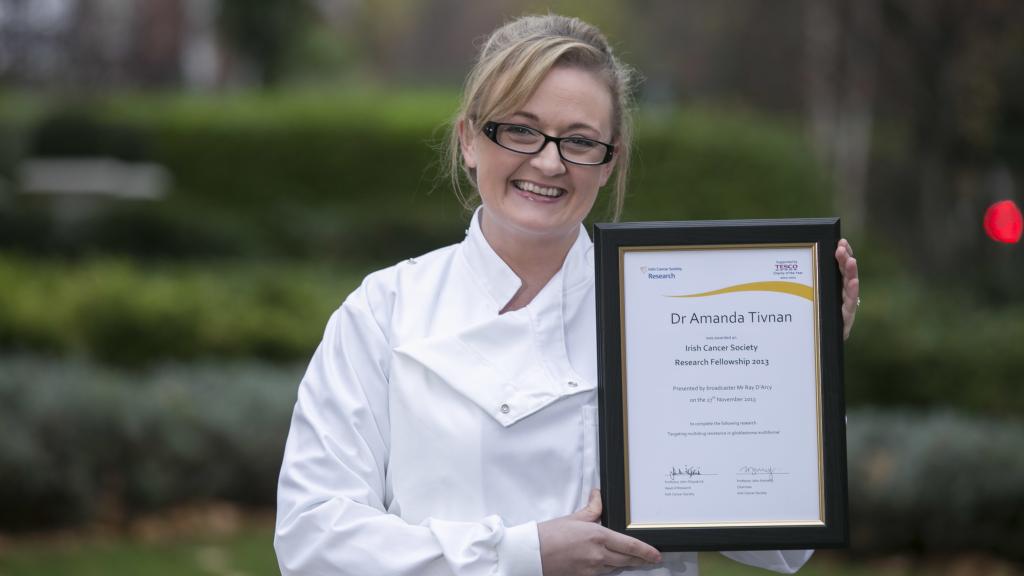
Irish researcher makes breakthrough to enhance impact of chemotherapy on Brain Tumours
Irish researchers have identified a way of switching off the action of pumps, called transporters, which rapidly remove chemotherapy drugs from brain cancer cells before they have enough time to kill the tumour. The breakthrough research by Dr. Amanda Tivnan of The Royal College of Surgeons in Ireland (RCSI), which was funded by the Irish Cancer Society, targets these pumps allowing the chemotherapy to remain within the brain cancer cells for a longer time and thereby increasing cancer-killing abilities.
Approximately 350 adults are diagnosed with brain tumours every year in Ireland. Advances in surgery and radiotherapy have led to modest increases in survival rates but there is still a significant body of brain cancer research focussing on finding new drugs or combination treatments to better target the cancer. However, improvement of the action of drugs currently in use, or improving the way in which they are delivered to the cancer cell can also play a big role in improving survival rates for patients.
This breakthrough research, which was presented by Dr Tivnan at the ‘Controlling Cancer Summit’ in London last week (14th May), found that stopping the action of these cellular pumps by means of drugs and treatments which selectively block their action, resulted in a significantly higher proportion of glioblastoma brain tumour cells being killed by the chemotherapy, compared to those brain tumour cells whose pumps were not restricted.
While any form of brain cancer is serious, diagnosis of a patient with glioblastoma multiforme (GBM) is the most complex and aggressive form of brain cancer in adults. The findings of Dr Tivnan’s research has significant implications in providing researchers with an opportunity to improve currently used chemotherapeutics for the initial treatment of primary GBM, and improved treatment for recurrent brain tumour patients.
Dr. Tivnan said “A diagnosis of GBM currently holds the worst outcome for patients; therefore our research is focused on looking at avenues to improve current treatment options for these patients. This research has, for the first time, uncovered the effect of targeting pumps on this particular form of brain cancer allowing chemotherapy a longer time within the cells to increase cancer killing abilities. We are continuing to build on this important research in order to develop novel technologies which could potentially result in better treatments for patients with brain tumours, especially those with GBM.”
Commenting on Dr Tivnan’s research, Dr. Robert O’Connor, Head of Research, Irish Cancer Society said, “The Irish Cancer Society is delighted to see that our investment in brain tumour research is supporting breakthroughs which will make a real difference to patients in the future. This breakthrough research, which was made possible by Irish Cancer Society research funding, shows how important it is to not only identify new treatment options but to also enhance the existing treatments to support brain cancer patients in Ireland. Such vital research is only made possible by the generosity of our community since the money raised is the only way we can support the activities of researchers fighting to improve cancer treatment in Ireland”.
To coincide with the announcement of Dr. Tivnan’s research, the Irish Cancer Society is highlighting the signs and symptoms of brain cancer. Anyone who is concerned about brain cancer should visit their GP or call the Irish Cancer Society’s National Cancer Helpline Freefone on 1800 200 700.
